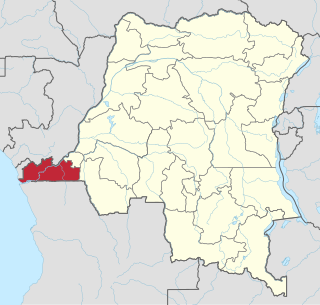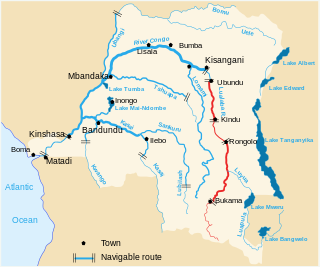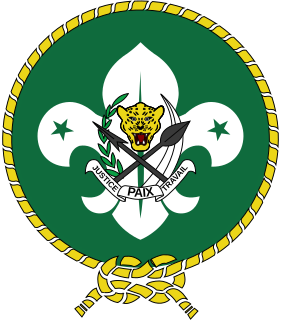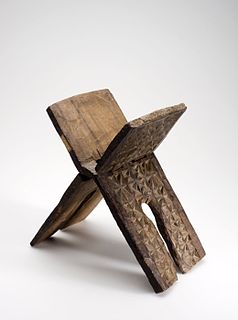
Kongo Central, formerly Bas-Congo, is one of the 26 provinces of the Democratic Republic of the Congo. Its capital is Matadi.

The Makua people, also known as Makhuwa, are a southeastern African ethnic group predominantly found in north Mozambique and southern border provinces of Tanzania such as the Mtwara Region. They are the largest ethnic group in Mozambique, and primarily concentrated in a large region to the north of the Zambezi River.

Lesbian, gay, bisexual, and transgender (LGBT) persons in the Democratic Republic of the Congo may face legal challenges not experienced by non-LGBT residents. Same-sex sexual activity is legal. Both male and female same-sex sexual activity is legal in the Democratic Republic of the Congo, same-sex couples and households headed by same-sex couples are not eligible for the same legal protections available to opposite-sex couple.

The Luama River is a tributary of the Lualaba River in the Democratic Republic of the Congo (DRC).

Kalemie, formerly Albertville or Albertstad, is a town on the western shore of Lake Tanganyika in the Democratic Republic of the Congo. The town is next to the outflow of the Lukuga River from Lake Tanganyika to the Lualaba River.

Gombe or La Gombe is a municipality (commune) in the Lukunga district of Kinshasa, the capital city of the Democratic Republic of the Congo. It was formerly known as Kalina, after Lieutenant E. Kallina - an Austro-Hungarian soldier who volunteered in the Congo Free State. Gombe is bounded on the north by the Congo River and in the south by the Boulevard du 30 Juin.

The Fédération des Scouts de la République démocratique du Congo (FESCO), the national federation of eleven Scouting organizations of the Democratic Republic of the Congo, was founded in 1924, and became a member of the World Organization of the Scout Movement (WOSM) first in 1963 and again in 1981. The coeducational Fédération des Scouts de la République démocratique du Congo has 71,486 members as of 2010.

The Arab slave trade is a name used to refer to the intersection of slavery and trade surrounding the Arab world and Indian Ocean, mainly in Western and Central Asia, Northern and Eastern Africa, India, and Europe. This barter occurred chiefly between the medieval era and the early 20th century. The trade was conducted through slave markets in these areas, with the slaves captured mostly from Africa's interior, Southern and Eastern Europe, the Caucasus, and Central Asia.

Islam is a minority religion within the Democratic Republic of the Congo where the large majority is affiliated to various Christian denominations and sects. Though estimates vary, it is generally believed that approximately 1 percent of the country's population identify as Muslim. It was first introduced from the East African coast during the Arab traders in the 19th century and remains largely concentrated in parts of Eastern Congo, notably Maniema Province. Most Congolese Muslims are Sunni and follow the Maliki school of jurisprudence (fiqh).

The Congo–Arab War took place in what is now the Democratic Republic of the Congo between the forces of Belgian King Leopold II's Congo Free State and various Zanzibari Arab slave traders led by Sefu bin Hamid, the son of Tippu Tip. Fighting occurred in the eastern Congo between 1892 and 1894. It was a proxy war, with most of the fighting being done by native Congolese, who aligned themselves with either side and sometimes switched sides. The causes of the war were largely economic based, since Leopold and the Arabs were contending to gain control of the wealth of the Congo. The war ended in January 1894 with a victory of Leopold's Force Publique. Initially, King Leopold II collaborated with the Arabs, but competition struck over the control of ivory and the topic of Leopold II's humanitarian pledges to the Berlin Conference to end slavery. Leopold II's stance turned confrontational against his once-allies. The war against the Swahili-Arab economic and political power was presented as a Christian anti-slavery crusade.

Isangi is a town in the Tshopo Province of the Democratic Republic of the Congo, headquarters of Isangi Territory.
Louis-Napoléon Chaltin (1857–1933) was a Belgian career soldier and colonial official notable for his service in the Congo Free State during the late 19th century.
The Elila River is a tributary of the Lualaba River in the Democratic Republic of the Congo. It rises in Mwenga Territory of Sud-Kivu Province and flows west through Shabunda Territory and then Pangi Territory in Maniema Province, entering the Lualaba just downstream of Kindu.

The Lega people are an ethnic group of the Democratic Republic of the Congo. In 1998 their population was about 250,000.
The Air Transport Authority of the Democratic Republic of Congo (RVA) is the air transportation board of the Democratic Republic of the Congo. Its head office is at the intersection of N'Dolo Airport and Avenue Kabasele Tshiamala, in the Ndolo neighbourhood of the Barumbu commune of Kinshasa. The agency operates 54 airports in the DRC.

Muhammad bin Khalfan bin Khamis al-Barwani, commonly known as Rumaliza, was a Swahili slave and ivory trader in East Africa in the last part of the nineteenth century. With the help of Tippu Tip he became Sultan of Ujiji. At one time he dominated the trade of Tanganyika, before being defeated by Belgian forces under Baron Francis Dhanis in January 1894.
National Library of the Democratic Republic of Congo is located in Kinshasa and was established in 1974 as an office within Ministry of Culture and Arts. In 1989, it became autonomous under presidential order.
First Lady of the Democratic Republic of the Congo is the title attributed to the wife of the president of the Democratic Republic of the Congo. The country's current first lady is Denise Tshisekedi, wife of President Félix Tshisekedi, who had held the position since January 24, 2019.













